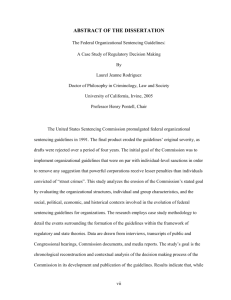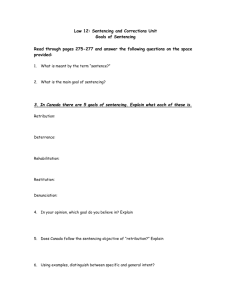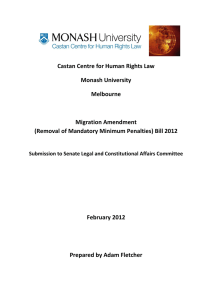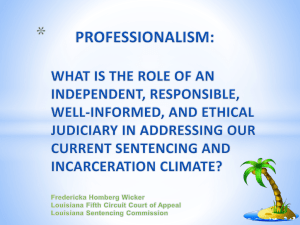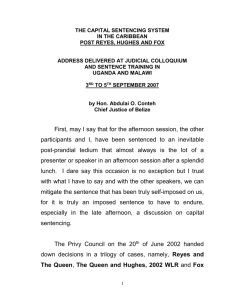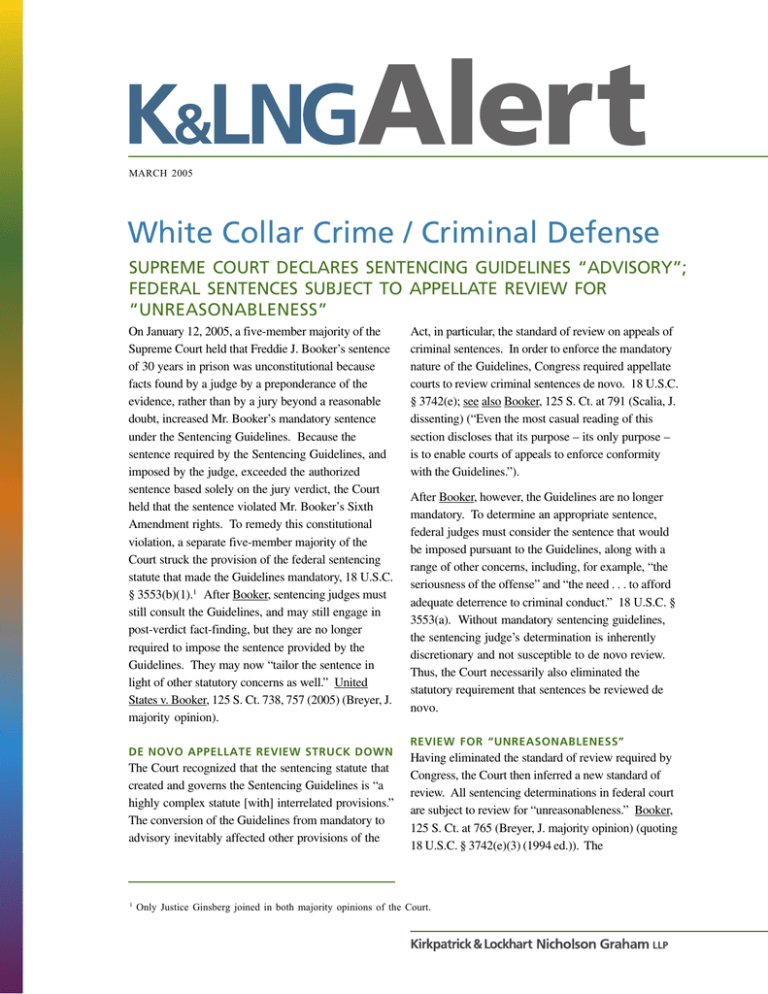
MARCH 2005
White Collar Crime / Criminal Defense
SUPREME COURT DECLARES SENTENCING GUIDELINES “ADVISORY”;
FEDERAL SENTENCES SUBJECT TO APPELLATE REVIEW FOR
“UNREASONABLENESS”
On January 12, 2005, a five-member majority of the
Supreme Court held that Freddie J. Booker’s sentence
of 30 years in prison was unconstitutional because
facts found by a judge by a preponderance of the
evidence, rather than by a jury beyond a reasonable
doubt, increased Mr. Booker’s mandatory sentence
under the Sentencing Guidelines. Because the
sentence required by the Sentencing Guidelines, and
imposed by the judge, exceeded the authorized
sentence based solely on the jury verdict, the Court
held that the sentence violated Mr. Booker’s Sixth
Amendment rights. To remedy this constitutional
violation, a separate five-member majority of the
Court struck the provision of the federal sentencing
statute that made the Guidelines mandatory, 18 U.S.C.
§ 3553(b)(1).1 After Booker, sentencing judges must
still consult the Guidelines, and may still engage in
post-verdict fact-finding, but they are no longer
required to impose the sentence provided by the
Guidelines. They may now “tailor the sentence in
light of other statutory concerns as well.” United
States v. Booker, 125 S. Ct. 738, 757 (2005) (Breyer, J.
majority opinion).
DE NOVO APPELLATE REVIEW STRUCK DOWN
The Court recognized that the sentencing statute that
created and governs the Sentencing Guidelines is “a
highly complex statute [with] interrelated provisions.”
The conversion of the Guidelines from mandatory to
advisory inevitably affected other provisions of the
1
Act, in particular, the standard of review on appeals of
criminal sentences. In order to enforce the mandatory
nature of the Guidelines, Congress required appellate
courts to review criminal sentences de novo. 18 U.S.C.
§ 3742(e); see also Booker, 125 S. Ct. at 791 (Scalia, J.
dissenting) (“Even the most casual reading of this
section discloses that its purpose – its only purpose –
is to enable courts of appeals to enforce conformity
with the Guidelines.”).
After Booker, however, the Guidelines are no longer
mandatory. To determine an appropriate sentence,
federal judges must consider the sentence that would
be imposed pursuant to the Guidelines, along with a
range of other concerns, including, for example, “the
seriousness of the offense” and “the need . . . to afford
adequate deterrence to criminal conduct.” 18 U.S.C. §
3553(a). Without mandatory sentencing guidelines,
the sentencing judge’s determination is inherently
discretionary and not susceptible to de novo review.
Thus, the Court necessarily also eliminated the
statutory requirement that sentences be reviewed de
novo.
REVIEW FOR “UNREASONABLENESS”
Having eliminated the standard of review required by
Congress, the Court then inferred a new standard of
review. All sentencing determinations in federal court
are subject to review for “unreasonableness.” Booker,
125 S. Ct. at 765 (Breyer, J. majority opinion) (quoting
18 U.S.C. § 3742(e)(3) (1994 ed.)). The
Only Justice Ginsberg joined in both majority opinions of the Court.
“unreasonableness” standard was attacked in dissent
by Justice Scalia, who argued that it was both
unprecedented and amorphous. “What I anticipate
will happen is that ‘unreasonableness’ review will
produce a discordant symphony of different standards,
varying from court to court and judge to judge.”
Booker, 125 S. Ct. at 794 (Scalia, J. dissenting). The
majority disagreed, contending that review for
“unreasonableness” was both practical and familiar,
and that “appellate judges will prove capable of . . .
applying such a standard across the board.” Booker,
125 S. Ct. at 766 (Breyer, J. majority opinion).
Both opinions include some truth and some
hyperbole. The “unreasonableness” standard has
applied historically only to a small subset of
sentencing decisions. Its application to all sentencing
determinations is, in fact, unprecedented - score one
for Justice Scalia. But the more important question –
the question that both prosecutors and defendants
must face as they seek review of criminal sentences –
is whether review for “unreasonableness” will create a
“discordant symphony” or a practical and workable
framework. On this question, the majority likely is
correct.
Review for “unreasonableness” is a far less amorphous
concept than, at first, it appears. This is so because,
like many broad legal standards, its content has been
narrowed, clarified, and explained through the realworld adjudication process. “Unreasonableness”
review has long been statutorily mandated for a
certain class of sentencing decisions – resentencing
upon revocation of probation and supervised release.
There never have been mandatory guidelines
dictating sentences to be imposed upon revocation of
probation. Rather, the Sentencing Commission chose
“to promulgate policy statements only,” see
Sentencing Guidelines, Ch. 7, § A.1, which have
unanimously been held to be advisory prescriptions
for sentencing courts. Thus, the post-Booker
guidelines, in their entirety, have the same force and
effect as the pre-Booker “policy statements”
applicable to probation violations. As the Booker
majority noted, appellate courts for years have
reviewed for “unreasonableness” probation revocation
2
sentences. That review has led to consistent standards
among the various circuit courts.
Thus, if – as a majority of the Court indicated – the
standard of review historically applied only to
probation revocation sentences is now the standard to
be applied to all sentences, the role of appellate courts
in the new sentencing system likely will be limited.
Indeed, if precedent is our guide, a sentence imposed
in the exercise of a district court judge’s discretion
will be upheld as “reasonable” if the trial court (1)
expressly considered the guideline sentence; (2)
articulated reasons why the guidelines should, or
should not, apply to a particular sentence; and (3)
justified any departures from the guidelines with
reference to the broad penological criteria listed in 18
U.S.C. § 3553(a) (i.e., “the nature of the offense” and
“the need for the sentence imposed”).
APPEALS ON DIRECT REVIEW
Appellate review to ascertain the “reasonableness” of
discretionary sentences should not prove problematic,
but it will be some time before we know. The first
discretionary sentences that will be subject to review
were not imposed until after the Court decided
Booker. Those defendants convicted before Booker
were sentenced in accordance with the mandatory
Sentencing Guidelines. The most immediate postBooker questions for the appellate courts are whether
“review for unreasonableness” applies to sentences
imposed under the mandatory system, and, if so,
whether the imposition of a mandatory sentence was
per se “unreasonable.”
On the first question, the answer is sometimes. Those
defendants who objected at the time of sentencing to
the application of the Guidelines preserved their
Booker rights on appeal and are entitled to have their
sentences reviewed for “unreasonableness.”2
However, those defendants who did not preserve
through objection their Booker rights will have their
sentences reversed only if the sentencing court’s
mandatory sentence was “plain error.”
For defendants who preserved their Booker rights, the
question presented to the circuit courts is whether the
district court’s failure to exercise discretion renders the
There is some ambiguity as to what is required by the defendant at the time of sentencing to preserve his or her Booker
rights on appeal. This question is beyond the scope of this Alert.
2 FEBRUARY 2005
KIRKPATRICK & LOCKHART NICHOLSON GRAHAM LLP
sentence unreasonable. Thus far, the courts are split
on this question, with some courts finding mandatory
sentences per se unreasonable, and others finding that
the district court’s failure to exercise discretion was
harmless if the ultimate sentence was “reasonable.”
Those defendants subject to “plain error” review must
show not only that the sentencing court improperly
treated the Guidelines as mandatory (all pre-Booker
sentences improperly treated the Guidelines as
mandatory), but also that (1) the sentence prejudiced
the defendant, and (2) allowing the sentence to stand
would “impugn the fairness, integrity, or public
reputation of judicial proceedings.” Again, the circuit
courts are split on whether a mandatory pre-Booker
sentence satisfies this standard. The Sixth, Fourth and
Ninth Circuits, for example, have held that any
sentence that was increased based on judicial factfinding was plainly erroneous and must be remanded
for resentencing. The Eleventh and First Circuits,
alternatively, have held that the defendant must show
a reasonable probability that the sentencing judge
would have imposed a different sentence under a
discretionary system.
CONCLUSION
The role of appellate courts in the post-Booker world
of criminal sentencing is in flux. Although there is
some uncertainty as to how the appellate courts will
determine the “reasonableness” of post-Booker
discretionary sentences, the greater uncertainty
applies to those criminal defendants sentenced under
the pre-Booker mandatory regime, who now seek
resentencing under the post-Booker discretionary
system. The standard of review in these appeals, and
the likelihood of securing a remand for resentencing,
3 FEBRUARY 2005
depends on numerous factors, including whether the
issue was preserved for appeal, whether the defendant
can present evidence that the sentence would have
been lower under a post-Booker regime and, perhaps
most importantly, which circuit court conducts the
review.
NOTES:
1) Visit our White Collar Crime/Criminal Defense
practice description: http://www.klng.com/
practices/practices_detail.asp?id=000002116003.
2) Visit our February 2005 Alert entitled “The
Department of Justice Responds to The Supreme
Court’s Recent Decision on Sentencing
Guidelines” http://www.klng.com/files/
tbl_s48News/PDFUpload307/11209/
wcccd0205.pdf
3) Visit our January 2005 Alert titled “The Impact on
Corporations of the Supreme Court’s Decision on
the United States Sentencing Guidelines,” http://
www.klng.com/files/tbl_s48News/PDFUpload307/
11115/wcccd0105.pdf.
Mark A. Rush
mrush@klng.com
412.355.8333
Robert L. Byer
rbyer@klng.com
412.355.6200
Paul J. Berks
pberks@klng.com
412.355.6578
KIRKPATRICK & LOCKHART NICHOLSON GRAHAM LLP
If you have questions or would like more information about K&LNG’s White Collar/Criminal Defense practice,
please contact one of our White Collar/Criminal Defense lawyers listed below:
Boston
Dallas
Los Angeles
Miami
Newark
New York
Pittsburgh
Washington, D.C.
Michael DeMarco
Jacqueline R. Peterson
Richard P. Crane, Jr.
Beatrice A. Butchko
David S. Kwon
Eugene R. Licker
William O. Purcell
Mark A. Rush
Dick Thornburgh
Stephen W. Grafman
Barry M. Hartman
mdemarco@klng.com
jacqueline.peterson@klng.com
rcrane@klng.com
bbutchko@klng.com
dkwon@klng.com
elicker@klng.com
wpurcell@klng.com
mrush@klng.com
dthornburgh@klng.com
sgrafman@klng.com
bhartman@klng.com
617.951.9111
214.939.4926
310.552.5089
305.539.3371
973.848.4025
212.536.3916
212.536.3922
412.355.8333
202.778.9080
202.778.9057
202.778.9338
www
w.. k l n g . c o m
BOSTON
DALLAS
HARRISBURG
LONDON
LOS ANGELES
MIAMI
NEWARK
NEW YORK
PITTSBURGH
SAN FRANCISCO
WASHINGTON
Kirkpatrick & Lockhart Nicholson Graham is a combination of two limited liability partnerships, each named Kirkpatrick & Lockhart Nicholson Graham LLP, one established in Delaware, USA,
and one incorporated in England.
This publication/newsletter is for informational purposes and does not contain or convey legal advice. The information herein should not be used or relied upon in regard to any particular facts
or circumstances without first consulting a lawyer.
Unless otherwise indicated, the lawyers are not certified by the Texas Board of Legal Specialization.
Data Protection Act 1998 - We may contact you from time to time with information on Kirkpatrick & Lockhart Nicholson Graham LLP seminars and with our regular newsletters, which may be of
interest to you. We will not provide your details to any third parties. Please e-mail cgregory@klng.com if you would prefer not to receive this information.
© 2005 KIRKPATRICK & LOCKHART NICHOLSON GRAHAM LLP. ALL RIGHTS RESERVED.


